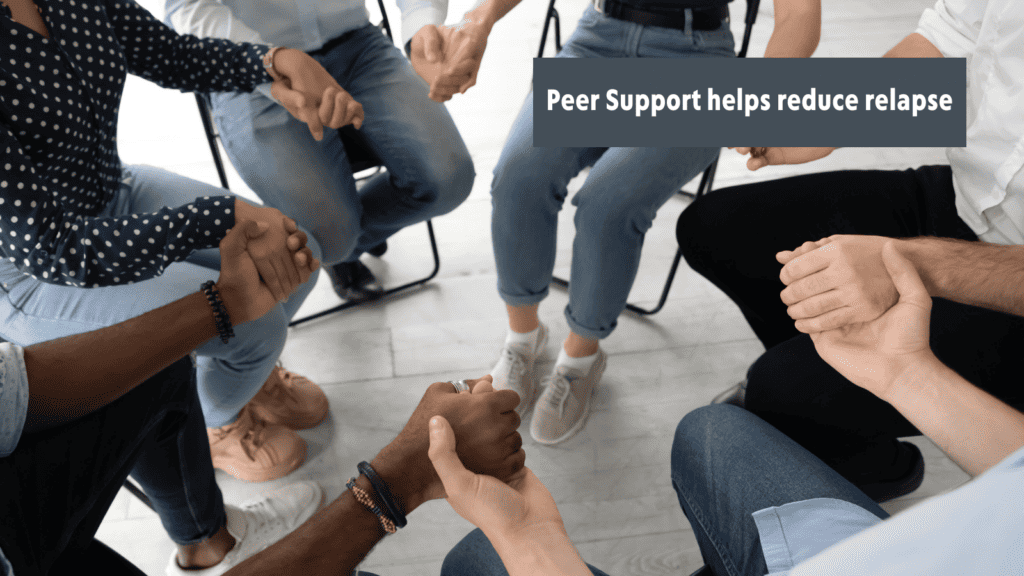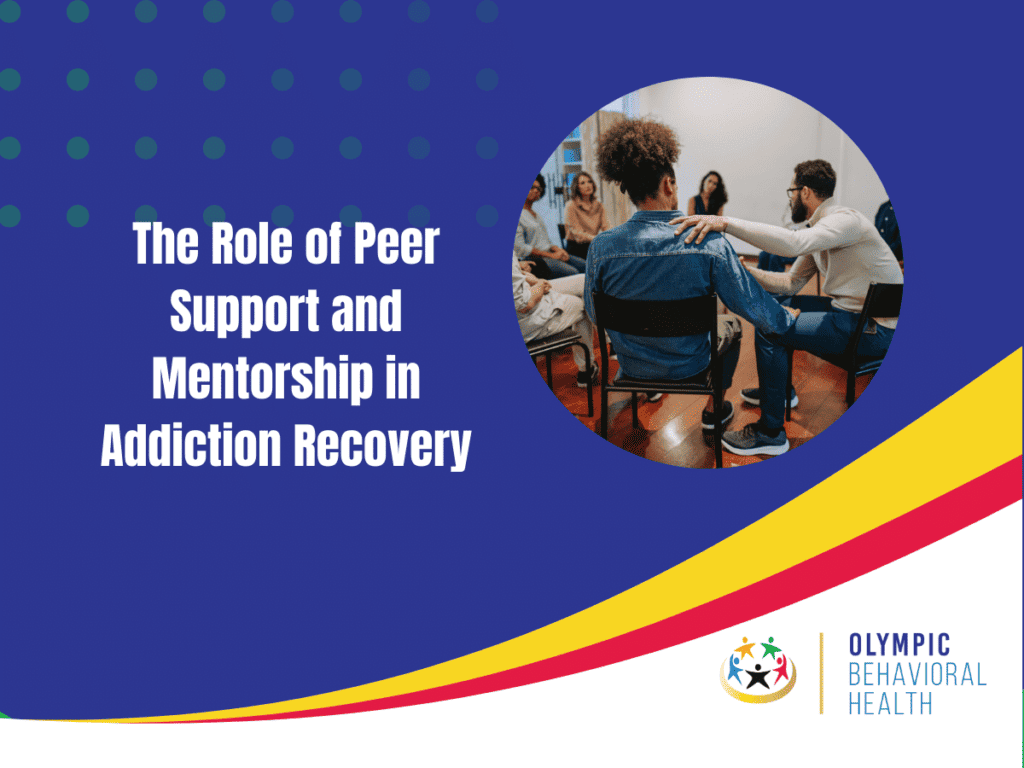Navigating the path of addiction recovery reveals the often underappreciated significance of peer support and mentorship. A study by the Substance Abuse and Mental Health Services Administration (SAMHSA) found that individuals participating in peer support programs have a 45% higher chance of maintaining sobriety. This form of social and emotional scaffolding provides a unique layer of understanding and empathy, distinctly different from professional therapy.
Rooted in shared experiences and mutual growth, peer support and mentorship have emerged as vital components in the intricate tapestry of addiction recovery. Serving as a practical resource, these supports assist individuals as they traverse the complex journey towards healing and sobriety. This sense of camaraderie and belonging fosters an environment where individuals feel acknowledged and valued, playing a crucial role in dismantling the stigma associated with addiction.

What is Peer Support and Mentorship and Is There A Difference?
Peer support and mentorship are two distinct yet interconnected approaches used in various contexts, including addiction recovery.
Peer Support:
Peer support involves individuals who have similar experiences coming together to support each other. In the context of addiction recovery, this means that people who are either currently struggling with addiction or are in recovery themselves provide mutual support. This support can take many forms, such as sharing personal experiences, offering emotional support, or just listening and empathizing. Peer support groups are often informal and emphasize equality among members; everyone’s experiences and contributions are valued equally. The key element of peer support is the shared understanding and empathy that comes from having similar experiences.
Mentorship:
Mentorship, on the other hand, involves a more experienced individual (the mentor), often called a sponsor, guiding a less experienced person (the mentee). In addiction recovery, a mentor is typically someone who has successfully navigated the recovery process and is now living a substance-free life. They offer guidance, advice, and support to mentees who are newer to the recovery journey. The mentor-mentee relationship is more structured than peer support, with the mentor often taking on a role that combines that of a coach, advisor, and role model. The mentor provides not just support, but also direction and inspiration.
The Difference:
The main difference between peer support and mentorship lies in the structure and nature of the relationship. Peer support is characterized by mutual, egalitarian support, where all individuals are seen as equals, and there is no inherent hierarchy. Mentorship involves a more experienced individual providing guidance and support to a less experienced person, with a clear distinction in roles. Both play crucial roles in addiction recovery, offering different yet complementary forms of support. Peer support offers a sense of belonging and mutual understanding, while mentorship provides direction, advice, and a model for successful recovery.
What Is the Impact of Peer Support in Addiction Recovery?
Peer support plays a transformative role in the realm of addiction recovery. This unique form of social interaction, grounded in empathy and shared experiences, goes beyond traditional therapeutic approaches. It offers a space where individuals can connect with others who have walked similar paths, fostering a sense of understanding and acceptance that is often crucial for healing. The impact of peer support in this context is multifaceted—it not only aids in reducing feelings of isolation and stigma but also enhances motivation and resilience by providing practical coping strategies and a supportive network.

How Does Mentorship Facilitate Successful Addiction Recovery?
Mentorship holds a pivotal role in guiding individuals through the complex landscape of addiction recovery. Unlike more formal therapeutic relationships, mentorship in this context is deeply rooted in personal experience and mutual understanding. Mentors, often having navigated their own recovery journeys, provide invaluable insights and lived wisdom to those newer in their recovery path. This relationship extends beyond mere guidance; it is a symbiotic connection where both mentor and mentee can grow and learn from each other.
What Are The Specific Types of Peer Support Groups?
Peer support groups come in various forms, each tailored to address specific needs and preferences. Here are some of the specific types of peer support groups, particularly in the context of addiction recovery:
- 12-Step Programs:
- Perhaps the most well-known, these include groups like Alcoholics Anonymous (AA) and Narcotics Anonymous (NA). These programs follow a set of guiding principles (the 12 steps) for recovery from addiction. They emphasize spiritual growth, personal responsibility, and mutual aid.
- Non-12-Step Support Groups:
- These groups offer an alternative to the spiritual approach of 12-step programs. Examples include SMART Recovery (Self-Management and Recovery Training) and Secular Organizations for Sobriety (SOS). They often focus on self-empowerment and a scientific approach to addiction recovery.
- Online Support Groups:
- With the rise of digital technology, online support groups have become increasingly popular. These can be in the form of forums, social media groups, or virtual meetings, providing accessibility and anonymity for those who may not be comfortable with or able to attend in-person meetings.
- Women’s or Men’s Groups:
- These are gender-specific groups like Women for Sobriety. They provide a safe space for individuals to discuss issues and challenges unique to their gender, which might not be as comfortably addressed in mixed-gender groups.
- Youth Support Groups:
- Catering to teenagers and young adults, these groups address the specific challenges and dynamics of recovering from addiction at a younger age. They often incorporate elements relevant to the younger demographic, like peer pressure and family dynamics.
- Dual-Diagnosis Groups:
- For individuals dealing with addiction and a concurrent mental health condition, dual-diagnosis groups offer a space to address both issues simultaneously. They recognize the interplay between mental health and substance abuse and provide integrated support.
- Family and Friends Support Groups:
- Groups like Al-Anon and Nar-Anon are designed for the friends and family members of individuals struggling with addiction. While not peer support groups for addicts themselves, they provide a supportive environment for their loved ones.
Each type of peer support group has its own methodology and focus, catering to different aspects of the recovery journey. Individuals may find one more suited to their needs based on their personal beliefs, lifestyle, and recovery goals.
What is the Difference Between Professional Therapy and Peer Support in Recovery?
The difference between professional therapy and peer support in recovery is significant, as each offers distinct benefits and serves different roles in the recovery process.
Professional Therapy:
- Expert Guidance: Professional therapy is provided by trained and licensed therapists, psychologists, or counselors. These professionals have academic and practical training in dealing with addiction and mental health issues.
- Structured Approach: Therapy typically follows a structured approach, often based on established psychological theories and methods such as Cognitive Behavioral Therapy (CBT), Dialectical Behavior Therapy (DBT), or other therapeutic models.
- Personalized Treatment: Therapists often tailor their approach to the individual’s specific needs, background, and mental health status. This can include addressing underlying psychological issues related to addiction, such as trauma or depression.
- Confidentiality: Professional therapy provides a confidential setting where individuals can explore sensitive personal issues safely.
- Clinical Assessment: Therapists are qualified to assess, diagnose, and treat mental health disorders, which can be crucial for individuals with dual diagnoses.
Peer Support:
- Shared Experience: Peer support is usually provided by individuals who have personal experience with addiction and recovery. This shared experience fosters a deep level of empathy and understanding.
- Mutual Support: Peer support is characterized by mutual aid and egalitarian support, where all members contribute and benefit from the group’s collective wisdom and support.
- Less Formal Structure: Peer support groups may be less formal and structured than therapy sessions. The focus is often on sharing experiences, offering encouragement, and providing practical advice based on lived experience.
- Accessibility and Flexibility: Peer support groups are often more accessible, both in terms of cost and location, and can offer more flexible meeting times than professional therapy sessions.
- Community and Belonging: These groups provide a sense of community and belonging, which can be crucial in overcoming the isolation often felt in addiction.
Key Differences:
- Professional therapy is typically more structured and clinically focused, addressing addiction in the context of overall mental health with a personalized treatment plan.
- Peer support emphasizes shared experiences and mutual aid, offering a communal environment where members can learn from each other’s journeys.
Both professional therapy and peer support are valuable in the recovery process, and many individuals find that a combination of both offers the most comprehensive support. Professional therapy provides expert guidance and treatment, while peer support offers empathy, practical advice, and a supportive community.
Can Peer Support and Mentorship Reduce Relapse Rates in Addiction Recovery?
Peer support and mentorship play a crucial role in addiction recovery, and there is evidence to suggest that they can effectively reduce relapse rates. These forms of support provide several key benefits that contribute to sustained sobriety:
- Accountability: Peer support groups and mentors create a sense of accountability, which is a strong motivator for maintaining sobriety. Knowing that others are aware of their goals and progress can encourage individuals to stay on track.
- Relapse Prevention Skills: Both peer support and mentorship often focus on developing coping strategies and relapse prevention skills. By sharing experiences and strategies, individuals can learn new ways to deal with triggers and cravings.
- Emotional Support: The emotional support provided in these settings can be a buffer against relapse. Feeling understood and supported reduces feelings of isolation, which is a key risk factor for relapse.
- Role Modeling: In mentorship, specifically, mentors act as role models, showing that recovery is possible. This can be incredibly inspiring and motivating for someone in the early stages of their recovery journey.
- Community and Belonging: Both peer support groups and mentorship foster a sense of community and belonging, which is vital for individuals who may have felt alienated due to their addiction. This sense of community can provide the social reinforcement needed to maintain sobriety.
- Ongoing Support: Unlike some structured treatments that have an end date, peer support and mentorship can provide ongoing support, which is crucial for long-term recovery.
Studies have shown that individuals who engage in peer support groups or have a mentor are less likely to relapse. This is attributed to the continuous support, learning from others’ experiences, and the therapeutic value of helping others, which is a key component of many peer support programs.

At Olympic Behavioral Health, We Can Help
While peer support and mentorship are not standalone treatments for addiction, they are valuable components of a comprehensive recovery plan. Their incorporation into an individual’s recovery journey can significantly reduce the likelihood of relapse by providing ongoing support, accountability, and a sense of community.
If you or a loved one are on the path to overcoming addiction, Olympic Behavioral Health is here to guide you every step of the way. Our compassionate team, comprehensive programs, and supportive community offer the tools and support needed for lasting recovery. Don’t let another day pass in uncertainty. Contact us today, and start your journey towards a brighter, healthier future. Your story of transformation and renewal begins here, with us.

Share This Post



